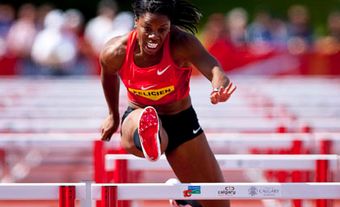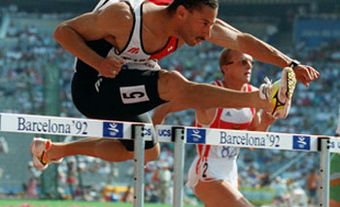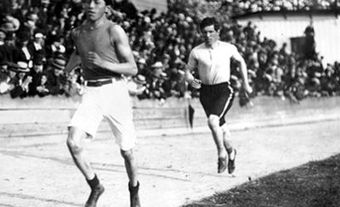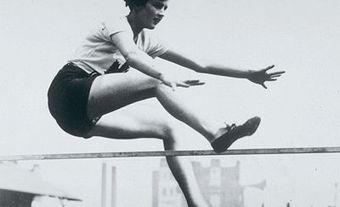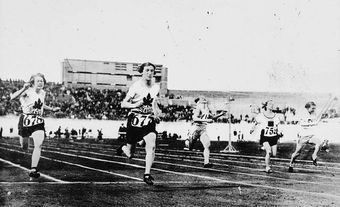Earl John “Tommy” Thomson, athlete, coach (born 15 February 1895, in Birch Hills, NWT [now in SK]; died 19 May 1971 in Annapolis, Maryland). Earl “Tommy” Thomson (sometimes appears as Thompson) was a versatile athlete who specialized in the high hurdles. He was the first person to run the 120 yard hurdles in under 15 seconds and won a gold medal in the 110 m hurdles at the 1920 Olympic Summer Games with a world record time of 14.2 seconds. He repeatedly set world records and was an innovator in the sport before becoming a successful college coach. Raised in California, he enlisted in Canada’s air force during the First World War and competed for Canada internationally. He was inducted into the inaugural class of Canada’s Sports Hall of Fame, as well as the National Track and Field Hall of Fame (US) and the Saskatchewan Sports Hall of Fame.

Early Years
Earl “Tommy” Thomson was born on a farm about 35 km from present-day Prince Albert, Saskatchewan. When he was eight years old, his family moved to Southern California for his mother’s health and eventually settled in Long Beach. They retained their British subject status (the precursor to Canadian citizenship, which was introduced in 1947).
When Thomson was 14 years old, he almost died after being shot in the chest with a shotgun in a hunting accident.
Thomson attended Long Beach Polytechnic High School and developed into a superb all around athlete. He played baseball and football and competed in track and field. At the inaugural California Interscholastic Federation (CIF) State Meet, held in 1915, Thomson won the 120 yard hurdles. In the spring of 1916, he enrolled at the University of Southern California. He joined the track team and set a world record of 14.8 seconds in the 120 yard high hurdles. He was the first person to run the race in under 15 seconds. That fall, Thomson transferred to Dartmouth College in Hanover, New Hampshire.
First World War
Thomson postponed his studies to fight for Canada in the First World War. In 1917, he enlisted as an observer trainee in the Royal Flying Corps, Canada (now the Royal Canadian Air Force). He was initially stationed in Toronto but was transferred to a base near Beamsville, Ontario. Thomson joined the base’s track team and participated in an air force track meet in Bowmanville, Ontario, in 1918. He finished in first place in five events and second in one. Thomson enlisted too late in the war to serve overseas. (See also The Great War in the Air.)

Track Star
After the war, Thomson returned to Dartmouth College to resume his studies and his athletic career. Over the next few years, he established himself as one of the world’s best hurdlers. He introduced a new technique in hurdling in which, rather than jump over the hurdles, he would run over them, leaning forward with his arms and torso. This approach soon became standard in the sport.
Thomson won the American Athletic Union (AAU) championship for the 120 yard hurdles in 1918, 1921 and 1922. At the 1919 Intercollegiate American Amateur Athletic Association (IC4A) Championships in Philadelphia, Thomson set a world record in the high hurdles of 14.4 seconds. He successfully defended his title in 1920 and again in 1921. At the National Collegiate Athletic Association’s (NCAA) first national intercollegiate championships, held at Stagg Field in Chicago in 1921, Thomson won the high hurdles by equalling his own world record time.
1920 Olympic Summer Games
The high point of Thomson’s athletic career was his performance at the 1920 Olympic Summer Games in Antwerp, Belgium. The games of the Seventh Olympiad were the first in which only the National Olympic Committee could enroll participants. The opening ceremony was the first to feature the raising of the Olympic flag and the taking of the Olympic oath.
Initially, Thomson had planned on representing the United States. However, he was ruled ineligible to compete with Team USA because of his British subject status and his enlistment in Canada’s air force. He went to the Olympic trials in Montreal and qualified for the Canadian team in the broad jump and the high hurdles. Two Americans were Thomson’s main rivals in the 110 m hurdles. The three athletes were even for the first 50 m, but Thomson surged ahead and won the gold medal with a world record time of 14.2 seconds. He was the first non-American to win the Olympic gold medal in that event.

Post-Olympics Career
After his 1922 AAU championship, Thomson retired from personal athletic competition. That same year, he married Anne Cookman. Thomson held coaching positions at Dartmouth College, the University of West Virginia and Yale University before becoming head coach for the track and field team at the United States Naval Academy in Annapolis, Maryland, in 1927. He held the position for 36 years. In 1945, Thomson’s track and field team won the NCAA outdoor championships. It is the only time a military service academy has won an NCAA track and field title.
At some point in the 1940s, Thomson began to lose his hearing and became almost completely deaf. He retired from coaching in 1963.
Honours and Death
Thomson was appointed to the US Olympic Track and Field Committee for the 1940 Olympic Games, which were subsequently cancelled due to the Second World War. In 1964, Oglala Sioux athlete Billy Mills won the gold medal for the United States in the men’s 10,000 m at the Olympic Summer Games in Tokyo, and credited Thomson with inspiring him to excel.
Thomson was inducted into the Canadian Olympic Hall of Fame in 1949 and into the inaugural class of Canada’s Sports Hall of Fame in 1955. He was posthumously inducted into the Saskatchewan Sports Hall of Fame in 1974; the National Track and Field Hall of Fame (US) in 1977; the Dartmouth College Athletic Hall of Fame in 1984; and the Prince Albert Sports Hall of Fame in 1989. Thomson died of cancer in 1971 at the age of 76.
See also Canadian Gold Medal Winners at Olympic Summer Games; Canadian Gold Medal Winners at Olympic Winter Games.

 Share on Facebook
Share on Facebook Share on X
Share on X Share by Email
Share by Email Share on Google Classroom
Share on Google Classroom
